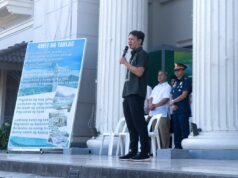Degradation continues at the Donggwang golf site. Photo by Ric Gonzales
ANGELES CITY – The water supply at the Metro Clark area is threatened by the on-going construction of a $400-million golf course on the top of a mountain at the Clark Freeport, a Pampanga-based environmentalist said on Tuesday.
Sonny Dobles, president of the Alliance for the Development of Central Luzon (ADCL), said “what is more disturbing about this is that water security for the area is now in clear and present danger” poised by the 36-hole golf course of the Donggwang Clark Corporation (DCC).
He added that primarily threatened are the cities of Mabalacat and Angeles and the town of Magalang.
“The explanation is simple. The area where the golf course is being developed is a watershed. Worse, it’s a head watershed that supplies the water of the two major rivers in the affected areas,” said Dobles.
Dobles cited a study commissioned by the Clark Development Corp. (CDC) during the time of former CDC President and CEO Romeo David.
He said that in the study conducted by Louis Berger International, Inc. in 1997 of the Clark Special Economic Subzone Master Development Plan, one of the problems noted in the subzone watersheds was “impaired watershed hydrology resulting in erratic water supply, water shortage and floods.”
The same study recommended the protection of watersheds, including second-growth forests and “in the interest of watershed management and to conserve water quality for potential future water supply, a policy needed to be formulated restricting development use of land for potentially polluting uses such as golf courses in the area of certain watersheds,” he added.
Dobles also cited the letter-resolution of the the Pampanga Association of Water Districts (PAMAWAD) submitted to the CDC five years ago calling for the moratorium on the construction of golf courses at Clark.
Dobles lambasted the CDC for the “unabated construction of the mountain-top golf course at the watershed.”
“The company has already cut down hundreds of trees, levelled off the mountain and caused serious soil erosion.
This development should be stopped and we urge you to do an investigation on how this construction has become possible despite existing environmental laws and development plans.”
Dobles said “benefit of the doubt and ample time” should be given to CDC Board chairman and officer-in-charge Eduardo Oban Jr.
He said the Korean firm DCC was given the green light to build a tourism estate, including the golf course, in the e 304-hectare area by then CDC President-CEO Benigno Ricafort in December 2010.
“But Mr. Oban should be reminded that reports are going around that it seems CDC is very much protective of the DCC and its golf course to the point that the state-owned firm has ceased issuing statements in the media after it was exposed last month,” said Dobles.




